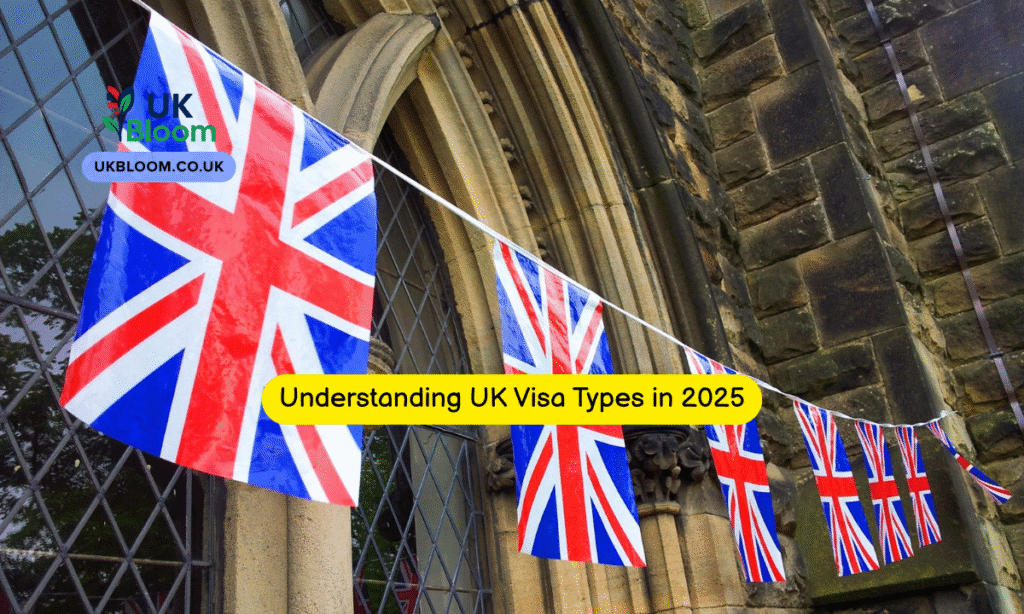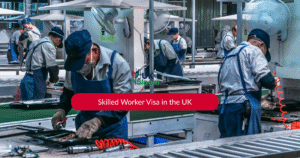Updated on 17/10/2025
At UKBloom, understanding the various UK visa types for 2025 is important for individuals and families seeking opportunities in the UK, whether for work, study, or family reunion. The country’s migration landscape has adapted to new regulations, fees, digital processes, and compliance requirements, providing clear pathways for each purpose. This guide offers a warm, practical overview, helping navigate the first steps toward residency or temporary stay.
Table of Contents
UK Visa Types System Overview
The UK’s visa system consists of multiple categories, each tailored for specific needs: work, study, family, short-term stays, and business. Recent updates have introduced digital eVisas, enhanced compliance for students, and fee adjustments effective April 2025.
- Work visas cover skilled workers, global talent, entrepreneurs, and temporary labor.
- Student visas apply to all study levels, with new compliance rules and levies.
- Family visas allow spouses, partners, and dependents to join residents.
- Visitor visas are for tourism, business, and short events.
- Settlement routes lead towards indefinite leave to remain (ILR) and citizenship.
Types of UK Visas (2025)
Work Visa Categories
UK work visas are available for skilled professionals, temporary workers, intra-company transfers, and high-potential individuals.
- Skilled Worker Visa: For jobs meeting salary and skills criteria.
- Health & Care Worker Visa: Specialist pathway for medical professionals.
- Global Talent Visa: For applicants with recognized expertise in science, humanities, engineering, arts, or digital technology.
- Scale-up Visa: For high-growth companies recruiting exceptional talent.
- High Potential Individual Visa: For recent graduates from top global universities.
- Global Business Mobility (GBM): Multiple sub-routes for company transfers, suppliers, trainees, etc.
Fee Breakdown for Work Visas 2025
IHS: Immigration Health Surcharge, see full fee table below.
Student Visa Categories
The UK remains a top destination for international students, but 2025 brings important changes:
- Student Visa: For post-16 education at recognized institutions.
- Child Student Visa: For school-age children at independent schools.
- Short-term Student Visa: Now includes a genuineness test for English language studies.
- Graduate Visa: For post-study work, now shortened from 24 to 18 months starting 2026.
- Dependents: New rules for English language and financial documentation.
2025 Student Visa Fees and Costs
| Visa Type | Application Fee | IHS/year | Total (1yr) |
|---|---|---|---|
| Student Visa | £524 | £776 | £1,300 |
| Graduate Visa | £822 | £1,035 | £1,857 |
| Dependent Visa | £524 | £776 | £1,300 |
Family & Partner Visa Categories
Family visas allow loved ones to unite in the UK for extended periods and possible settlement.
- Spouse/Civil Partner Visa: For recognised partnerships with UK residents.
- Fiancé(e)/Proposed Civil Partner Visa: For intended marriages/civil partnerships.
- Parent/Child/Other Dependent Visas: For eligible immediate family.
Fees and IHS for Family Visas
Family Visa Fees and IHS (2025)
Visitor Visa Types
For short visits, including tourism, business, or academic purposes, various visitor visas apply.
- Standard Visitor Visa: For tourism, family visits, or short business trips.
- Marriage Visitor Visa: To get married in the UK.
- Academic Visitor Visa: For visiting academics.
- Transit Visa: For changing planes in the UK.
Visitor Visa Fees 2025
| Visa Type | Application Fee (2025) |
|---|---|
| Standard Visitor | £127 |
| 2-Year Visitor | £475 |
| 5-Year Visitor | £848 |
| 10-Year Visitor | £1,059 |
| Marriage Visitor | £179 |
Settlement, Residency & ILR
Indefinite Leave to Remain (ILR) enables permanent living, working, and studying in the UK.
- Qualified via certain long-term visas (work, family, business), typically after five years.
- Must pass the continuous residence, English language, and Life in the UK test.
Special and Humanitarian Routes
- British National (Overseas), Commonwealth and EU/EEA/Swiss Citizens: Distinct processes following Brexit; some require Electronic Travel Authorisations (ETA) from April 2025.
- Ukraine Family Scheme, Homes for Ukraine: Humanitarian protections for those fleeing conflict.
Cost Breakdown Table: UK Visa Fees 2025
New Digital Systems and Changes for 2025
Digital eVisas and ETAs
By 2025, many UK visas and permissions will be issued as digital eVisas, providing fast, paperless approvals. The ETA is required for certain nationals entering the UK from April 2025, but does not guarantee entry, only permission to travel.
Student Visa Reforms
- Reduced Graduate Visa (PSW) duration: Now 18 months, affecting students from January 2026 onward.
- Mandatory international student levy: 6% additional cost.
- Stricter compliance: Higher enrollment/completion thresholds, enhanced agent reporting, and English requirements for dependents.
Increased Fees and Surcharge
Most visa fees increased by up to 10% from April 2025. The annual Immigration Health Surcharge (IHS) for most adult visas is now £1,035 per year; for students and under-18s, it remains £776 and must be paid up front.
Typical Application Steps
- Choose the correct visa category for the purpose of stay.
- Prepare supporting documents: ID, proof of funds, sponsorship, acceptance letters, and family or work evidence.
- Apply online via the official UK immigration portal.
- Attend biometric enrolment if required.
- Pay the application fee and Immigration Health Surcharge.
- Wait for the decision and, if successful, receive an eVisa
Internal Linking
- Link to your Visa Eligibility Calculator, Step-by-Step UK Visa Application Guide.”
- For students, “How to Choose the Right UK University” and “Graduate Route
- For professionals, link to “Skilled Worker Visa Points Calculator
External Linking
- Official UK government sources: gov.uk/visas-immigration, Home Office visa fees table.
- University info: UKCISA, Prospects.
- Visa application partners: VFS Global.
FAQs
What is the Immigration Health Surcharge (IHS)?
The IHS is a mandatory fee for most long-term UK visa applicants, covering NHS access during your stay. For 2025, it is £1,035 per adult and £776 for students/children per year.
Which UK visa should skilled professionals choose?
Most skilled professionals will apply for the Skilled Worker Visa. Ensure the job meets salary and skill criteria; see NHS and shortage occupation lists for eligible roles.
Is it still possible to switch visas inside the UK?
Yes, many categories allow for in-country switching—e.g., Student to Skilled Worker, or Partner to ILR—given eligibility requirements are met.
Has the UK Graduate Visa changed in 2025?
Yes, the Graduate Visa, or Post-Study Work Visa, now provides 18 months post-graduation (previously 24 months), with eligibility adjustments for dependents and stronger compliance monitoring.
Do short-term visitor visas require a health surcharge or financial proof?
No, visitor visas (up to six months) do not require IHS or minimum funds proof unless requested by caseworkers.
What digital changes apply to new arrivals in 2025?
Digital eVisas and Electronic Travel Authorisations mean you may not receive a physical visa—check the UK’s official portal for eligibility and instructions.
How do UK student visa changes impact applicant choice?
The 2025 reforms mean stricter English requirements, a reduced post-study work period, and higher costs (including a 6% international student levy). Students should carefully compare universities by compliance ratings and career support.
Table: Visa Type Comparison (2025)
Conclusion
- Choose the right visa category; check eligibility and gather documents early.
- Budget for higher fees and health surcharges—especially for family or long-term stays.
- Understand digital visa processes; check your eVisa and ETA requirements before travelling.
- Use official resources like gov.uk, UKCISA, and trusted law firms.
- Leverage UKBloom tools for calculators, cost estimators, and application walkthroughs.
Disclaimer
This article is for informational purposes only and does not constitute legal or immigration advice. Please refer to official UK government sources or seek legal support for specific guidance.
Copyright Notice
© UKBloom.co.uk. This article is protected by copyright law. Reuse allowed with proper credit to your website.






